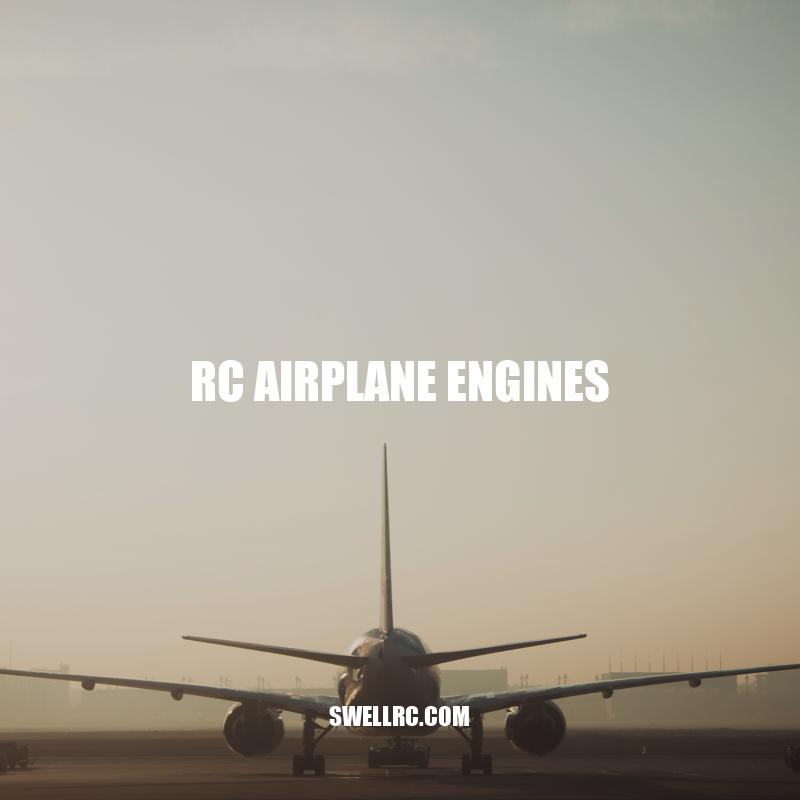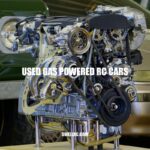Guide to RC Airplane Engines: Types, Choosing, and Maintenance
RC airplane engines are the driving force that powers these miniature flying machines through the air. Without an engine, an RC airplane is just a model that cannot take off or perform any flying maneuvers. Thus, the engine is an essential component of any RC plane. There are three primary types of RC airplane engines: electric, nitro, and gas. Each type has its features and benefits, making them ideal for certain planes and flying styles. Electric engines are lighter and quieter than nitro and gas engines, making them perfect for smaller planes and indoor flying. Nitro engines, on the other hand, offer higher power output and give the plane a more realistic experience. Gas engines are the most powerful of the three and are used mainly for large RC planes such as jets. Understanding the different types of engines and their features is crucial when choosing the right engine for an RC plane. In this article, we will explore the different RC airplane engines and their features, as well as some helpful tips on how to select and maintain an engine. Whether you’re new to RC planes or a seasoned pilot, the information provided here will help you make an informed decision when choosing the right engine for your RC plane.
RC airplane engines come in a few different types, each with unique features and benefits. Here are the three primary types of RC airplane engines:
- Electric Engines: These engines run on batteries and are the lightest and quietest of the three. They are easy to use and maintain and are perfect for small planes and indoor flying. Some good electric engines include the Castle Creations Talon HV 120 and the HobbyKing YEP ESC.
- Nitro Engines: Nitro engines use fuel and offer the highest power output among the three types. They are heavier and louder than electric engines but provide a more realistic flying experience. Popular brands of nitro engines include OS and Saito.
- Gas Engines: Gas engines use gasoline, and they are the largest and most powerful of the three types. They are ideal for larger planes, including jets, and can provide an extended flight time. Some of the best gas engines include the DLE 55RA and the NGH GT9pro.
Knowing the differences between the types of RC airplane engines will help you choose the right engine for your plane and flying style. Whether you prefer a more realistic flying experience with nitro or a lightweight, quiet engine with electric, there is an engine out there for you. Furthermore, before making a purchase, be sure to check online forums, such as RC Groups, to get an idea of what type of engine would work best for your plane.
How many types of airplane engines are there?
There are five types of airplane engines, including:
- Piston engine
- Turboprop engine
- Turbofan engine
- Turbojet engine
- Ramjet engine
Each type of engine has its own unique characteristics and advantages.
If you want to learn more about airplane engines, there are many websites available that can offer more detailed information. Some examples are:
- www.aircraftengineersalary.com
- www.aandeproperties.com/aviation-turboprops-book
- www.pw.utc.com/Products/Commercial/Engines
These websites provide useful insights and resources for both aviation enthusiasts and professionals.
Choosing an RC Airplane Engine
Choosing the right RC airplane engine is essential for the performance of your plane. Here are some factors to consider before making a purchase:
- Size and Weight: The engine should match the size and weight of the plane. A bigger engine could cause the plane to be too heavy, while a smaller engine may not provide enough power.
- Power: The amount of engine power affects the plane’s speed, flight time, and durability. A more powerful engine will result in a faster plane with a shorter flight time.
- Fuel Type: The type of fuel used by the engine will determine the maintenance needed and the associated costs.
- Price: Consider the price of the engine before making a purchase, as some engines may be more expensive than others. However, it’s important to keep in mind that a higher price tag does not always mean better quality.
- Brand: The brand of the engine can affect its quality and lifespan. It’s recommended to choose engines from trusted brands with a good reputation, such as OS, Saito, and DLE.
It’s essential to consider these factors when choosing an RC airplane engine to ensure that you select the right engine for your plane. Additionally, maintenance is key to ensuring optimal performance and longevity of your engine. Check with the engine’s manufacturer for specific maintenance requirements or search online forums for tips on proper engine maintenance.
Table of RC Airplane Engine Comparison
Below is a table comparing the main features of the three types of RC airplane engines:
| Engine Type | Power Output | Weight | Fuel Type | Price |
|---|---|---|---|---|
| Electric | Low-Moderate | Lightest | Battery | Low-Moderate |
| Nitro | High | Heaviest | Fuel | Moderate-High |
| Gas | Very High | Heavy | Gasoline | High |
How to choose servo motor for RC plane?
Selecting the right servo for your RC plane is important for its smooth and stable functioning. Here are some factors you need to consider while choosing servo motor for your RC plane:
- Check the torque required by your plane’s control surfaces (elevator, rudder, etc) and choose a servo with sufficient torque.
- Determine the size and weight of your plane to ensure the servo matches it in terms of size and load capacity.
- If you need precision control, choose a servo with a high resolution.
- Choose a reliable and durable brand to avoid any malfunction during flight.
- Consider the power source you will be using and choose a compatible servo motor.
Some of the popular brands you can consider for servo motors are Hitec, Futaba, and Spektrum. Websites like Amazon, HobbyKing, and Tower Hobbies have a wide selection of servo motors to choose from.
| Brand | Max Torque | Price Range |
|---|---|---|
| Hitec | 20-600 oz-in | $10-$100 |
| Futaba | 18-200 oz-in | $15-$70 |
| Spektrum | 10-400 oz-in | $20-$60 |
Tips on Maintaining Your RC Airplane Engine
Proper maintenance is crucial for the optimal performance and longevity of your RC airplane engine. Here are some tips on how to maintain your engine:
- Clean the Engine: Use compressed air to clean debris and dirt from your engine after every flight.
- Check for Damaged Parts: Check the engine’s parts, such as bearings and cylinders, for wear and tear regularly. Replace any damaged parts immediately to prevent further damage to the engine.
- Proper Fuel Mixture: Use the right fuel mixture for your engine, as incorrect fuel mixture can cause damage to your engine. Refer to the manufacturer’s instructions before using any fuel.
- Break-In Period: Run your engine through an appropriate break-in period, as specified by the manufacturer, to optimize its performance.
- Run the Engine Regularly: Running your engine regularly helps prevent build-up and ensures lubrication to essential engine parts.
By properly maintaining your RC airplane engine, you can avoid costly engine repairs or replacements and achieve optimal performance during flight.
There are also several websites that offer helpful information and resources for RC airplane engines and maintenance. These include:
- RC Airplane World: This website has a comprehensive guide on RC airplane engines, including engine types, power output, and maintenance tips.
- Horizon Hobby: This online store offers a range of RC airplane engines and parts, as well as useful resources and forums for beginners and experienced pilots alike.
How long can an airplane engine last?
The lifespan of an airplane engine depends on various factors, such as how often it is used, how it is maintained, and the type of engine. Here are some estimates for jet and piston engines:
| Engine Type | Lifespan Estimate |
|---|---|
| Jet | 20-25 years or 20,000-30,000 flight hours |
| Piston | 2,000-3,000 flight hours or 12-15 years |
It’s important for airlines and pilots to conduct regular maintenance checks and follow manufacturer recommendations to ensure the longevity and reliability of the engines. For more information, check out aviation-related websites such as AvWeb or Aircraft Owners and Pilots Association (AOPA).
Conclusion
In conclusion, RC airplane engines are a vital part of any RC aircraft and are responsible for providing the thrust needed for flight. Choosing the right engine based on factors like weight, size, and power output can significantly affect the performance of your RC plane. Routine maintenance is also essential for the longevity and optimal performance of your engine. By following the tips and resources outlined in this article, you can choose the best RC airplane engine for your specific needs and keep it running smoothly for many flights to come.



